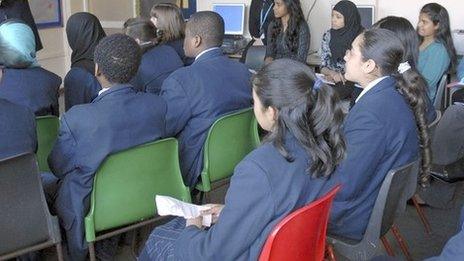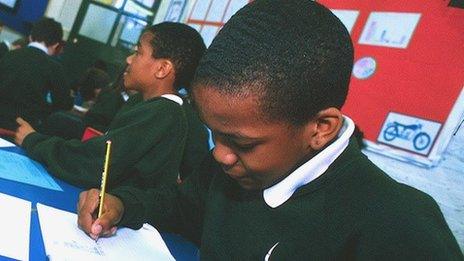Rise in secondary school pupils over next decade
- Published

There will be 3,287,000 children in secondary schools by 2024
The number of pupils attending England's secondary schools is set to rise by 20% over the course of the next decade, government figures show.
By 2024, nearly 3.3 million pupils are expected to be attending state-funded secondaries, compared with just over 2.7 million in 2015, a rise of 547,000.
The increase is mainly due to the upturn in the birth rate since 2002, the Department for Education says.
The rise follows years of falling rolls due to low birth rates in the 1990s.
State primary schools in England will also see a rise in pupil numbers, although not as great as in secondary schools due to lower birth rates in 2013.
The primary population is projected to be 4, 712,000 in 2024 - 336,000 higher than in 2015.
Low predictions
The DfE figures also show that projections in 2014 were slightly too low, with 75,000 more children than forecast set to enrol in state primary and secondary schools by 2024.
There will be 20,00 more pupils than originally predicted in secondary schools in 2024 and 55,000 more in primary schools by 2023.

The primary sector will also see a rise in numbers, though not as great
A DfE spokesman said: "We want every parent to have access to a good school place for their child.
"Despite rising pupil numbers, 95% of parents received an offer at one of their three preferred schools.
"But we recognise that as the population grows, the demand for new school places increases.
"That is why we doubled the funding for school places to £5bn in the last Parliament, which has helped create almost 500,000 new school places.
"A further £7bn has already been committed to create even more places over the next six years."
But Russell Hobby, general secretary of the National Association of Head Teachers (NAHT), said some schools were "already stretched to their limits".
"The number of children in education is still rising, but the government lacks a coherent plan," he said.
"The current system is fragmented, and free schools are an inefficient and insufficient way of meeting the numbers.
"The NAHT believes that some local agency should have the strategic role in the planning of places, able to commission new schools and places in both the academy and maintained sectors."